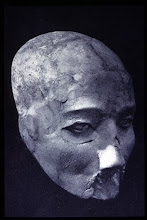I will admit it. I still feel John McCain nostalgia. And if a denizen of the far left cannot fully erase the McCain of McCain-Feingold etc., imagine the cognitive dissonance for centrists! Memory is stubborn, and cannot be separated from our experience of the present.
This McCain of memory is of course not actual but rather a product of political mythos, one polished during the GOP primary of 2000 and strengthened into the "Maverick brand" (though I find "branding" to be a shudder-inducingly vulgar intrusion of marketing into politics, the calling card of mass communication in the 21st century). Myth, Cassirer argues, is our most primal form of knowledge. It aggregates our experience and creates out of disparate events a broader controlling narrative, a way for us to make sense of a vast and chaotic world. But because it mixes so strongly with our imaginary and draws upon our most closely held commonplaces, myth cannot be easily overturned by events that run contrary to its narrative. These are outliers, rude exceptions to a more harmonious rule. Myth and memory create residue which cannot be wiped away.
The McCain myth is thus a political reality, and it is one that cannot be debunked through rational argument alone (for, though mything thinking is a precursor to what we now call reason, it plays more to our imaginative, emotional capacities than our logic). It cannot be disproven.
But it can be changed.
One cannot simply argue away a mythic narrative--the vacuum leaves behind chaos, and politics, being about collective meaning-making and deliberation, abhors a vacuum. One cannot replace a narrative whole-cloth because the memory which is tied to the myth refuses to dissolve. I may learn new and upsetting things about the "real" John McCain, but his previous appeal remains as memory.
We must change the narrative, shift it into another direction. We must alter the myth. This means acknowledging those stubborn parts of our memory, incorporating them while changing the plot of the story. John Kerry did a nice job of this at the DNC with his distinction between "Senator McCain" and "Candidate McCain," a distinction which itself feeds upon one of the most common elements of political mythology--that power and ambition corrupts even the most principled of people.
Lengthy theoretical preamble finished, here is another way one might use the same dynamic to retell the heretofore brilliantly managed McCain myth, using a familiar literary trope: the Dear John letter. Dear John letters of course are those ending a relationship after the dissatisfied lover has left. They tell a story of love which soured, and emphasizing what once was virtuous, honorable and cherished in the relationship only serves to heighten the tragedy and bitterness of betrayal.
Imagine an advertizing campaign based on a Dear John letter from moderate, middle class America:
Dear John,
For many years, I have felt nothing but respect for the courage you have shown in battle, for your principled support of bipartisan bridge-building, of your work to protect the democratic process from being perverted by monied interests.
But you have changed.
You surrounded yourself with lobbyists. You have become a Bush lapdog in search of acceptance and power. You have shown wanton disregard for the experience of average Americans who are losing their foothold in this floundering economy. You have turned from straight talk to dirty tactics.
You are not the John McCain I once respected. While I will always remember and honor the man you used to be, I don't know who you are anymore--but I know who you look like. And I can't afford four more years of the same.
Next time: The Professor is having a crisis of conscience.
Sunday, September 14, 2008
Subscribe to:
Post Comments (Atom)

No comments:
Post a Comment